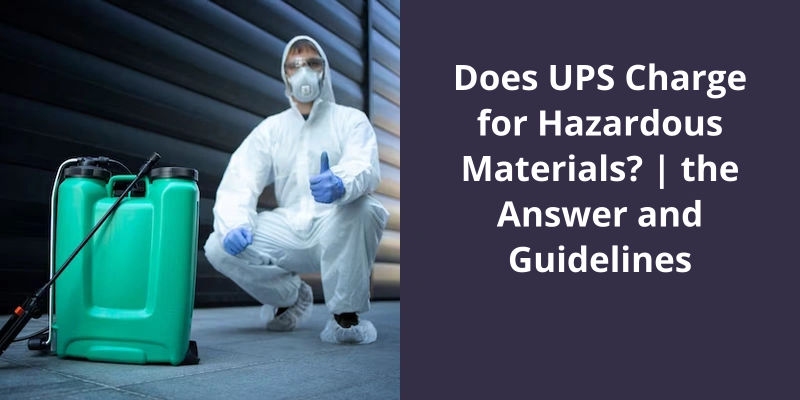Yes, UPS does charge for shipping hazardous materials. The exact cost might vary depending on the specific materials and their associated risks. UPS uses a comprehensive process to manage these materials, and the additional charge helps to cover the costs associated with this. It is also important to note that UPS requires proper packaging and documentation for hazardous material shipments, to ensure safety compliance. UPS provides guidelines to facilitate customers in safely shipping these materials.

How Much Is UPS Hazmat Shipping Fee?
Hazmat shipping is a necessary service that allows businesses to transport dangerous goods safely. However, it comes at an additional cost to shippers due to the extra precautions needed to handle hazardous materials. UPS is one of the leading providers of hazmat shipping in the United States, but many people are curious about how much it costs to use their services.
This charge is applied to each package that contains dangerous goods and is in addition to the regular shipping cost. The exact amount of hazmat shipping costs can vary depending on the weight and size of the package and the specific hazardous material being shipped.
It’s important to note that UPS has strict guidelines for shipping hazardous materials and requires shippers to follow certain procedures. This includes fully completing the Dangerous Goods Declaration form, properly labeling the package, and providing the correct packaging materials. Failure to comply with these guidelines can result in penalties or even the shipment being refused.
Despite the extra cost and regulations, many businesses still opt to use UPS Hazmat shipping due to it’s reliability and expertise in handling dangerous materials. Companies that need to ship chemicals, batteries, or other potentially dangerous substances can trust UPS to get the job done safely and efficiently.
Businesses and individuals who need to transport dangerous goods can trust UPS to handle their shipments with care and expertise, ensuring that they arrive at their intended destination without incident.
What Are the Different Categories of Hazardous Materials and How Do They Impact UPS Hazmat Shipping Fees?
- Explosive materials
- Gases
- Flammable liquids
- Flammable solids
- Oxidizing substances
- Toxic and infectious substances
- Radioactive materials
- Corrosive materials
- Miscellaneous dangerous goods
It’s important for businesses to have a trusted and reliable shipping partner that can handle hazardous materials safely and efficiently. UPS is one such partner, although their acceptance of hazmat shipments is limited to specific locations and operations. Let’s take a closer look at UPS’s hazmat shipping policies and how they ensure the safety of both the products and the people involved.
Does UPS Handle Hazmat?
Transportation Regulations. These hazardous materials include items like explosives, flammable liquids and solids, and radioactive materials.
In order to transport hazardous materials, UPS requires that customers have a contract and must follow strict procedures for packaging, labeling, and documentation. UPS also has a team of experts who specialize in hazardous materials transportation to ensure that all regulations are being followed and that the materials are being handled safely.
In addition to transportation services, UPS also has hazmat storage capabilities. This service includes secure storage facilities and expert handling of the materials.
Understanding the specifics of shipping fees and surcharges is important when it comes to managing your business’s shipping costs. While it’s not uncommon for shipping carriers to charge additional fees for certain types of deliveries, such as residential deliveries, it’s important to be aware of these charges and account for them in your budget. In the case of UPS, a residential surcharge applies to deliveries made to homes or businesses operating out of a home, and an additional shipping charge is added to each of these types of deliveries.
Does UPS Ever Charge a Delivery Fee?
The surcharge is applied to all residential deliveries, regardless of the packages size or weight. The delivery fee is a means of compensating UPS for the additional costs associated with delivering to residential locations. These costs include the need for specialized equipment and additional labor to ensure the package is safely delivered to the customers doorstep.
While some customers may find the additional fee frustrating, it’s important to note that the fee is relatively small compared to the overall cost of shipping.
However, these fees are typically only applied in special circumstances and aren’t a regular part of the shipping process for most customers.
When shipping with UPS, it’s important to carefully review the shipping options and fees associated with each delivery. By doing so, customers can ensure that they’re getting the best possible rate for their shipping needs while still receiving high-quality service and reliable delivery.
Comparison of Delivery Fees Charged by Different Package Delivery Services.
- UPS Ground: $7.99
- FedEx Ground: $8.49
- USPS Priority Mail: $7.35
- DHL Express: $12.99
- Amazon Prime 2-day: $0 (with membership)
Conclusion
In conclusion, the transportation of hazardous materials poses a significant risk to both people and the environment. As such, it’s essential for shipping companies such as UPS to take adequate measures to ensure the safe handling and transportation of such materials. One of these measures is the application of a hazardous materials service handling charge on all hazardous materials/dangerous goods packages that require a shipping paper or Shipper's Declaration for Dangerous Goods. This charge helps to cover the costs associated with the safe handling and transportation of these materials, including training, handling, and regulatory compliance.





